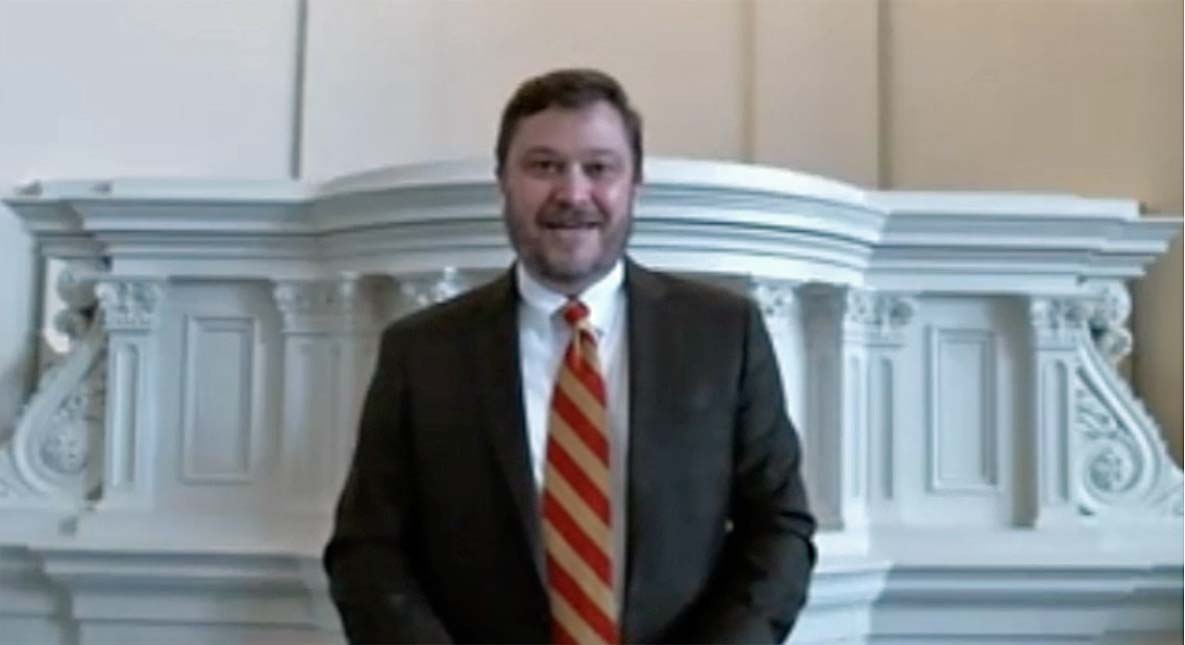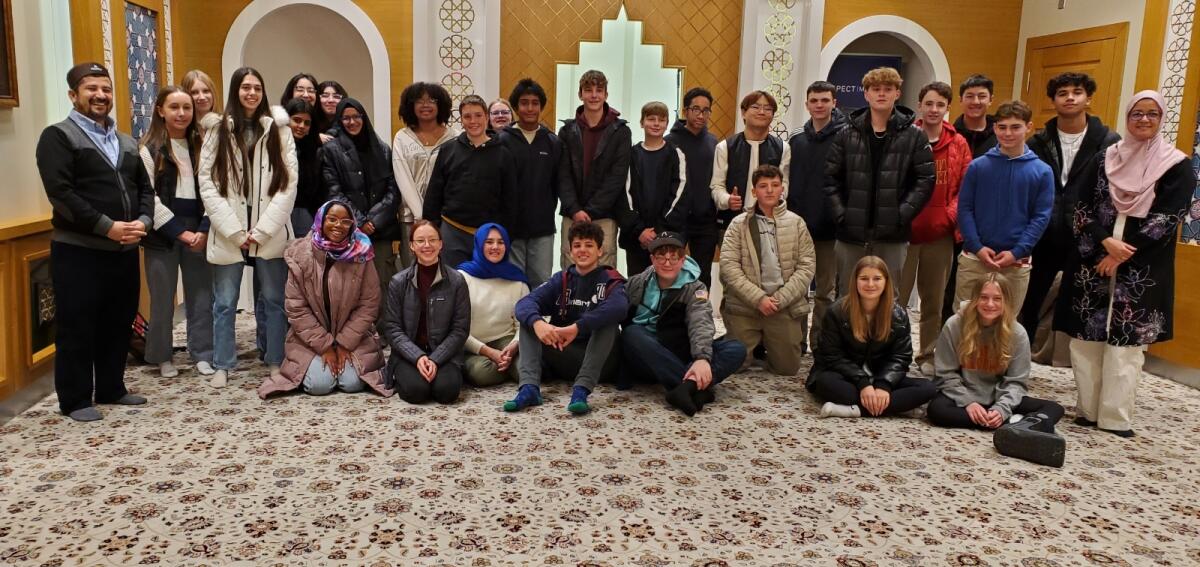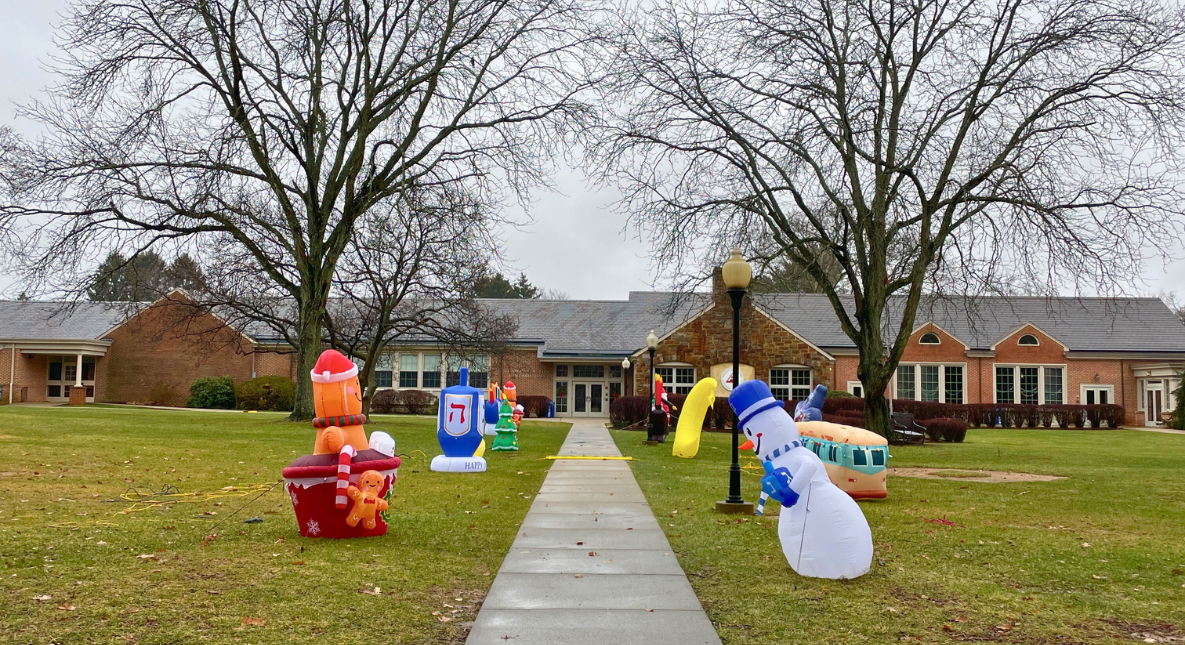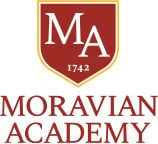2020-21 Opening Chapel & Flag Raising
This year we celebrated an old tradition in a new way. Students, faculty, and staff members participated in chapel from their classrooms, while readers and singers went outside so they could remove their masks and be heard more clearly. With the help of Zoom, Head of School Jeff Zemsky spoke to us live from Central Moravian Church, keeping us connected to that sacred space. Our flags were raised by Sawyer '31, Oliver '27, Zander '24, and Pepper Ritchey '21 as Rowan Taylor '25 sang our Alma Mater accompanied by our Middle School music teacher, Mr. Nathan Diel. Even though we were spread across two campuses and joined by our virtual students learning at home, we still managed a school-wide "Hip-Hip-Hooray" with the help of Mr. Ben Wallace, our Lower School music teacher.
The All-School Opening Chapel and Flag Raising is one of several unique Moravian Academy traditions that help keep our hearts and minds connected to the many who have come before us. It’s a beautiful thing to know that our school has 279 years of history to lean on, learn from, and remind us who we are. Each of those 279 years has been unique, and each held its own gifts and challenges, just like each student and teacher and staff person who passes through our doors. But in all our diversity, we share a common story, a common love of learning, and a common commitment to grow in mind, body, and spirit.
Below you can see an excerpt of the chapel and read Head of School Jeff Zemsky's meditation.
Head of School Jeff Zemsky's meditation
Here we are - can you believe we finally made it here? The end of our first day back to school. You have endured a lot of changes and sacrifices and so much waiting to get to this place. I have, too. We have all done a lot of hard things to get to this point - and we know there is more ahead. So how do we do hard things? That’s what I want to think about with you during this chapel.
Let’s start here: Can you picture a beautiful sunrise? Can you picture one that you have actually seen with your own eyes, not a painting or photograph of someone else’s? Luckily, I think I’ve seen one that is more beautiful than all the others. It was at a place in the middle of the American wilderness, on the border between Utah and Arizona, on a high, rocky plateau called Muley Point. It was April 2010, or thereabouts, and I was there with students on a school camping trip. We sat on the red rocks that morning, and we spread ourselves out along a mesa top cliff so we could really take it in. We didn’t talk. It was cloudy. There was a lot of gray, which made the spots of red and orange and pink stand out. We looked over the red rocks, and in the new light, we could see into canyons with canyons inside them. I’ve been thinking about that sunrise on Muley Point all summer.
The reason it is the most beautiful is not because of how it looked. Although it was quite pretty, I’ve seen sunrises that were brighter, more colorful, more glorious. It was the most beautiful because the night before, it was so dark that we didn’t even know if we were going to be able to see the sunrise. I’ll tell you about that in a minute.
I have a card that I keep with notes to myself. It’s like my roadmap for doing hard things. I’ve written ten things on this card this summer, after listening to many people who have endured challenges, some who are in the middle of overcoming great trials, some who have faced their greatest tests in the last 9 months, some in the last week. I admire all of them. Some of these people are on this Chapel Zoom right now, in rooms where you are sitting, some of them are you.
One person is an infectious disease doctor. He, like you, is a part of Moravian Academy. He and his team of scientists and researchers have helped teach me and others at MA how to reopen safely and to create this different kind of school that we are in. He treats sick people in the hospital at a time when there are a lot of people in the hospital. I asked him how he does it, day in and day out, and how he endures, how he stays focused and balanced when the world is overwhelming. He said, “Well, it was harder at the beginning, but it got easier over time because I remember why I do this. That I have a calling to help people, to teach people, to spread knowledge and health.” He said he remembers his faith, he prays. This doctor has an internal dialogue going on inside his head, just like you do. And he decides in that conversation in his head, that he’s going to listen for the call, listen for his purpose. That is number one on my list - hear the call.
Seeing your own purpose is hard, talking about your purpose or passion, is even harder. Sometimes it’s like trying to see a bird that you can hear in a tree. You know it is there but good luck finding that little songbird in that big tree. Perhaps you had some of these moments in thinking about starting this school year, perhaps when you were talking with your teachers about those roadmaps. Perhaps in some of those unanswered questions is a part of your purpose here in school. Look, it’s easy to talk about getting good grades. It’s hard to talk about why you are driven to learn, why you want to improve. It’s hard to talk about what inspires you. What if the answer is incomplete, or they won’t take you seriously, or what if they think you’re wrong?
I knew a student named Becca, who like all of us, had some of these doubts. Becca was there on that Muley Point sunrise. The afternoon before a fierce wind storm blew in as we were setting up camp. We had driven to this site, in the middle of nowhere, and you could not see past the nearest tree, it was so dark well before sunset. Tents were blowing over. No one could get stakes to stay in the ground. We could not keep the stoves lit to cook dinner. Rain was coming. I was a teacher guide on the trip and we made the decision to have students sleep in the vans that night. Everyone was worried and tense. I was worried and tense. Becca was the last person still trying to set up her tent in the middle of this terrible storm. I told her it was time to stop. She said she wouldn’t. She wanted to keep trying. I asked her why and she blurted out, without thinking about it, “I don’t even know why we are here … but... I don’t want to disappoint you!” I told her the smartest thing she could do is look around her and know when it is time to adjust, that I was where she was too, that I was very proud of her, and that tomorrow the sun would come up and we would know why we were there.
We made it through that night. It was quite a storm and we had little to protect us, but we worked together, we made good decisions, and we kept each other safe. We laughed a bit. The next morning, we woke up and walked to the edge of that awesome view. We saw this immense landscape that is known as Monument Valley in Arizona near where the Grand Canyon is, and we found out why we were there. We saw what we could not see the night before. That is why that sunrise is the most beautiful, because it was hard earned, because in the dark of night when we asked for help, there was a way forward. The sunrise revealed why we had come to that place. In my memory I see not only what was there, but I see the struggle we had endured and that is what makes it beautiful to me.
Later, back at school, I had to tell Becca in her junior year that her proposal had not been approved for an elite independent research program. I thought she would be okay with it. I told her and I knew immediately that she wasn’t. With tears in her eyes, she told me that she wanted it really badly. I told her, “Becca, I know you have this, you will propose this again, this is not the end of the story. It’s like Muley Point.” Becca went on to be a wonderful student, to be a great golfer in college, and a passionate leader. After graduating from college, Becca went right into politics, talk about doing hard things, and at a young age became her party’s official vice chairwoman in York County, Pennsylvania. She knows how to overcome challenges and she knows about her calling, about why she is where she is. She could not say all those things when she was in school, but they were inside her.
So that’s on my card of things to remember about “how to do hard things:” you need to be able to close your eyes and hear the conversation inside you, before you can really see it and before you can tell other people all about why you are doing what you are doing. If you can learn to recognize the sunrise before it appears, then you will be ready to do very difficult things.
So this is a sunrise moment for me. Ending this day with you here. I hope it is for you too. We are here again. Moravian Academy is here again. We did this! Who knows what we can do when the sun comes up tomorrow? I can’t wait to find out.


 myMA
myMA



.png)







